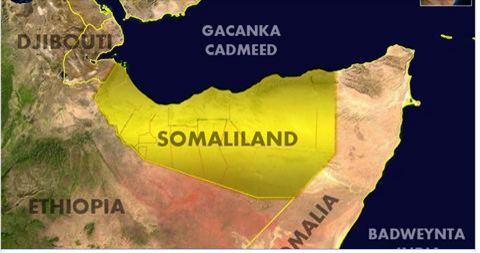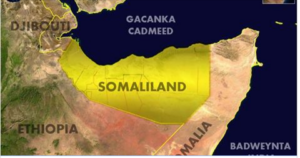The title above is a familiar cry one hears when people lament some shortcoming or problem that befalls Somaliland. It’s one we heard when the droughts hit or when political disagreements threatened to unravel the whole place. Yet, it is actually a pertinent question. It implies that there are people out there busy working on behalf of Somaliland (for its peace, security, progress and recognition). But who are they and maxay ku maqanyhiin?
At this point, in most articles containing the word Somaliland, there usually comes the breathless speech about five days of independence, 18th May, elections and the strive for recognition. I will not bother with that, as this is really aimed at Somalilanders who already know all the details off by heart. Let Mr Mikael Torstensson sing it to Swedes.
I will not deny the massive strides Somaliland made in the last twenty-seven years. It indeed made great progress and it’s my strong belief, that one day, it will achieve that elusive international recognition (not from Sheffield, Cardiff or Tower Hamlets, mind). But before I ululate or applaud the progress, I think my point would be better made if we go back right to the point of having a country named Somaliland.
The idea of a nation (at least to my simple mind) is one that has a collection of people aiming for the same purpose and working towards a goal of collective prosperity and progress. The two manifest themselves in the presence of peace, education/employment and health. Today, Somaliland is relatively peaceful and more prosperous than it was twenty-years ago. It has a countless number of universities and the government has dedicated a sizeable chunk of its budget to education. Businesses are springing up every day, lavish structures are being built and the country even has a national broadcasting arm. For all intents and purposes, the place looks like an organised country, smells like one and, more importantly, acts like one.
Yet, Somaliland yaa u maqan? Hundreds of thousands of diasporas send remittances every month. In addition, many of them have taken up the cause of Somaliland in their adoptive countries and are actively trying to sell the idea of recognition to whomever would listen. The goal is clear, the plan is set and all it seemly requires is to never give up, never let up and never stop.
The diaspora is also involved in a side business of supporting the various Somaliland political parties. Kulmiye, Ucid and Wadani have representatives in most countries. They meet, they collect money for the party and organise big events every time a big fish visits from Somaliland. The activism is vibrant, it’s alive and it keeps on whirring on behalf of Muse, Faysal or Abdirahman. The dedication is genuine and the belief is blind.
These same people also run their own familial projects. When a tribal member is ill, a murder takes place or a mosque in their native village requires funds, they band together and run around amongst the clan to collect the tributes. As you can see, at least superficially, Somaliland clearly ‘dad baa u maqan’. Alas, is that really what they’re there for?
Distance has its advantages and disadvantages and I feel that the disadvantages seem to play a bigger part in the case of Somaliland. For in the rush to achieve the recognition or help build the country, many have taken their eyes off the ball and forgot the simple steps of creating a nation. Side issues became more important than the most essential objectives. For example, Somaliland suffers from chronic poverty and serious institutional problems yet people are busy collecting money to build a mosque in areas where great big mosques already exist. Some school and government buildings are in dire state of repair yet Somaliland TV has a branch in the UK. Many roads are a danger to drive on yet the country has embassies and ambassadors in a number of major countries. I choose not to talk about the transient problem of inflation here. That’s due to government policy and the diaspora is not likely to affect it one way or the other.
The question then is, again, Somaliland yaa u maqan? Do the diaspora operate only as cheerleaders and endless pots of money that keeps propping up Somaliland? Does their expertise and “waayo argnimo” limit itself to finding ways to achieve recognition or advising a political party on how to win an election? Is their patriotism confined to singing the praises of Somaliland without pointing out the obvious wastage and mismanagement?
A case in point here is the Burco hospital. Burco is considered the second most populous city in Somaliland. Therefore, one would expect that such a large city would boast a half decent hospital. However, should anyone decide to visit the place, they would be shocked by the lack of equipment, the filthy conditions and mismanagement. Some diaspora is in the process of collecting donations for this hospital. But would that really solve the problem? I mean a hospital can be underfunded yet still remain a sterilised and clean place (or at least show that some attempt was made to keep it clean). This does not happen in Burco hospital. For I have seen pictures of the place taken in the 1990s and I have seen further pictures taken in late 2017. The place didn’t look clean in the 90s and, if anything, it seems to have deteriorated in 2017. Remember, this is a major hospital in one of the biggest cities of a country that has embassies in London, Dubai and Sweden. A country that has radio stations and a national TV.
It seems that every place that would show the world that Somaliland is a healthy, independent and upcoming country has been renovated, supported and sustained. The airport (where diaspora and foreigners come) looks great. Embassies where diaspora can boast about the progress of their nation and the outside world can begin to take Somaliland seriously have been allocated a budget. The national TV Station (and probably one or two government news websites) have been adequately financed. All in order to magnify and amplify the idea that Somaliland is a country on the up. People cheered when Zack Goldsmith talked about the results of the Somaliland elections in the British House of Commons. Others donned the humanitarian garb and went on fighting FGM; “it kills women” they shouted. And, of course, it does. But one assumes that these same one-eyed FGM warriors have visited the Burco hospital in their quest to fight the FGM menace. Have they not seen the conditions of the place? Did it not occur to them to raise a fuss about it? Surely a by-product of doing so would have aided their mission. Again, one assumes a woman or a girl that suffers complications from a botched FGM procedure would need to visit some hospital. What hospital? THAT hospital?
Somaliland dad baa u maqan. Politically it is somewhat a healthy country. But dadka u maqan really need to work on raising awareness on its administrative shortcomings alongside the sterling work they’re already doing on advertising the country. The discussion of the place needs to be turned on its head. Leave the trips of the president to the locals, pay no attention to the wails of the Suldans and don’t worry yourself too much about the arguments with Somalia. Share your waayo aragnimo and tell someone to clean that damn toilet (picture on top).
Ahmed H
London, UK








































